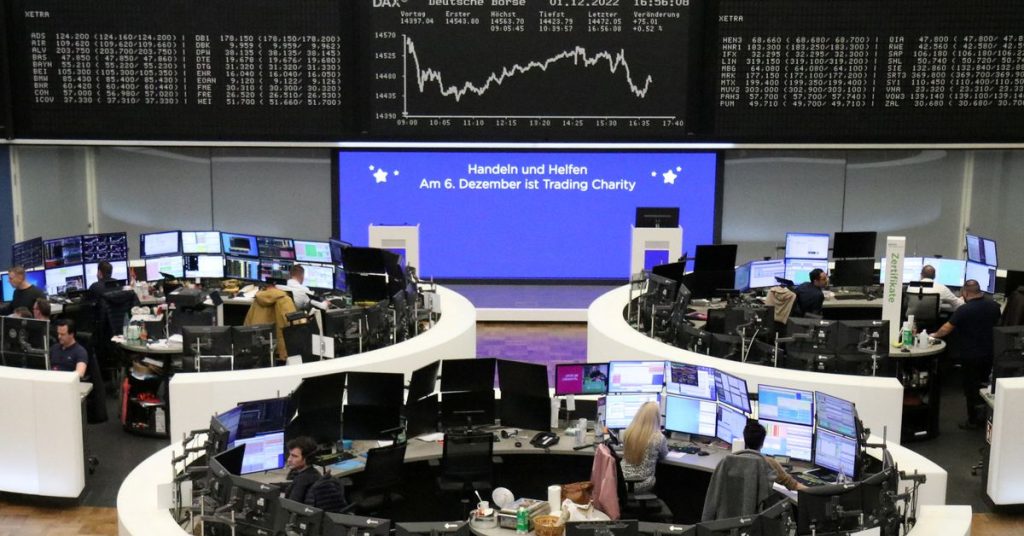LONDON (Reuters) – European stock indexes opened slightly lower on Monday, finding little support from easing restrictions imposed on local epidemics in China, after US jobs data on Friday dented market sentiment, which raised fears of persistent inflation.
Asian stocks were boosted early Monday on hopes that China’s steps to ease its coronavirus policy will support global growth and boost demand for commodities.
More Chinese cities announced easing COVID-19 measures on Sunday, after unprecedented protests over the restrictions last weekend. The news boosted Chinese stocks and pushed the yuan below 7 against the dollar. MSCI’s broadest index of Asia-Pacific shares outside Japan rose 1.7%. (.MIAPJ0000PUS).
But the impact on European markets was limited as investors were cautious about the extent of the reopening. The MSCI World Equity Index, which tracks stocks in 47 countries, rose just 0.3% on the day. (.MIWD00000PUS).
The European STOXX 600 fell 0.1%. (.STOXX)Germany’s DAX fell 0.4%. (.GDAXI) But the FTSE 100 in London rose 0.2%. (.FTSE).
“I think for a while we won’t know the true definition of zero-COVID because it’s been changing and developing very, very quickly in the last couple of weeks,” said Eddie Cheng, Head of Multi-Asset Portfolio Management at Allspring. global investment.
Cheng said the new facility “could add to the demand for raw materials but we also need to see … how it develops.”
China’s “no COVID” policies have hit the world’s second largest economy hard. Services activity contracted to a six-month low in November.
Cheng said market sentiment in Europe was still being pressured by “some inflationary forces,” particularly the region’s energy crisis.
Final PMI data showed business activity in the eurozone declined for the fifth month in November, indicating the economy was slipping into a mild recession.
The strong US jobs report for November hit Wall Street on Friday as it challenged hopes for a less aggressive Federal Reserve.
The euro rose 0.2% against the dollar, at around $1.0557, while the US dollar index held steady at 104.46, rebounding after optimism about easing lockdowns in China sent it to a five-month low earlier in the session.
Eurozone government bonds were little changed, with the German 10-year benchmark yield at 1.848%.
French central bank president Francois Villeroy de Gallo said on Sunday that the European Central Bank should raise interest rates by 50 basis points on December 15, reinforcing expectations that the ECB will slow the pace of monetary tightening after consecutive 75 basis point increases.
Investors’ attention remains focused on the pace of central banks ending their rate hike cycles. The Reserve Bank of Australia meets on Tuesday and is expected to raise interest rates by only 25 basis points. The Bank of Canada meets on Wednesday and is expected to raise interest rates by 50 basis points.
Oil prices rose after OPEC+ countries kept their production targets stable.
The Group of Seven industrialized nations took caps on seaborne oil prices into effect on Monday as the West tries to limit Moscow’s ability to fund its war in Ukraine. Russia said it would not abide by the measure even if it had to cut production.
(Reporting on Elizabeth Howcroft) Editing by Peter Graf
Our standards: Thomson Reuters Trust Principles.

“Typical beer advocate. Future teen idol. Unapologetic tv practitioner. Music trailblazer.”







More Stories
JPMorgan expects the Fed to cut its benchmark interest rate by 100 basis points this year
NVDA Shares Drop After Earnings Beat Estimates
Shares of AI chip giant Nvidia fall despite record $30 billion in sales